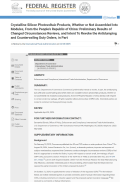Most Chinese people do not dislike John Mearsheimer—in fact, many even somewhat admire him. I’m among them. Yet I disagree with one aspect of his views, as do many Chinese scholars. We believe the world can achieve win-win development. Our admiration for him stems from his intellectual honesty—he speaks truths unvarnished. We welcome disagreements, for bridging divides across cultures demands sustained dialogue and mutual understanding. When he (and you) truly grasp China’s history, culture, and strategic mindset, it will become clear why we see coexistence as possible. Your belief that Sino-U.S. conflict is irreconcilable—framed as an inevitable clash between the reigning power and its challenger—is shaped by your cultural lens. That is your worldview, not ours.
I agree partially with your assertion: China will inevitably ascend to preeminence, while the U.S. will decline. China’s rise stems from its scale and size, coupled with cultural traditions that have honed the core competencies of a great power. Any nation possessing these attributes could claim a seat at the table. America’s problem is self-inflicted: it has squandered its advantages through repeated missteps, thus dooming its reign.
There’s no need to fear a post-hegemonic America. It need only adapt to new rules. One such rule is critical: no nation will—or should—replicate America’s former dominance (the “America First” paradigm). The world detests that model; no one desires its return, least of all China.
Remember my words: Aspiring to become a superpower wielding supreme authority is sheer folly. Such ambition accelerates an empire’s demise. The Chinese, heirs to a 5,000-year civilization, are no fools—especially those steering national governance. None would pursue an imperial model that shortens their nation’s lifespan.
Trust me, most Chinese people are not as tense or angry as you assume. You might think I am, but my concern is your
miscalculation—of China’s resolve and intentions. You must break free from preset assumptions and rethink.
As Professor Gao Zhikai noted:
“For 5,000 years, China thrived without America. It will thrive for another 5,000 years without America. Neither needs the other to survive.”
Short-term Sino-U.S. relations will remain strained, primarily because America refuses to confront its own flaws. China cannot yield, as compromise would embolden the U.S. to escalate demands, worsening tensions. Over the past 7-8 years, America has repeatedly proven this:
any concession is temporary, inviting greater aggression.
Only by inflicting deep, tangible pain on America can China force it to soberly reassess. Without this, dialogue is futile—mere theater for humiliation.
As for U.S. military prowess, especially naval dominance: rest assured, many of us dismiss it. China possesses methods to collapse U.S. military power but refrains from deploying them.
In China, many jokingly call Russians a "martial nation," but Russian scholars retort:
"Compared to the Chinese, Russians are amateurs." When Chinese hear this,
they chuckle inwardly, thinking:
"The Russians are shrewd—they’ve earned their status as a global pole."
To China, advanced weaponry is but one facet of strength. America’s current arsenal holds no technological edge—not even numerical superiority.
In Chinese discourse,
“strong” (强) and
“large” (大) are distinct. Russia is “small but strong”; America is “large but weak.” True strength lies in choosing formidable opponents. Russia’s “strength” stems from confronting NATO (even with its bungled Ukraine war). America, however, only bullies weaker adversaries—like a “
street thug” beating nursing homes and kindergartens. A Chinese doggerel mocks this:
“Punching the elderly in South Mountain,
Kicking toddlers in North Sea,
Shouting in the morgue:
‘Any dead dare defy me?’”
America’s wars target weaklings—opponents China and Russia disdain. Fighting such foes brings no honor, only shame. Imagine a heavyweight boxer fighting featherweights: it’s either propaganda or self-degradation. Does America not grasp this?
You deem U.S. naval power formidable? Only because China has not truly acted. Look at the
Houthis: their anti-ship capabilities mirror China’s 1990s tech. If China openly armed U.S.-sanctioned nations, America’s maritime hegemony would crumble.
China’s anti-ship ballistic missiles (ASBMs) already exceed 5,000 km ranges. Technically, establishing
10,000+ km maritime strike capabilities is feasible (military research papers confirm this).
Thus, overstate not U.S. power. China has no interest in challenging its hegemony—unless provoked. Let America exhaust itself playing “global cop.” China cares not for geopolitical quagmires; it’s content watching America squander its imperial vitality. China’s real stance:
“Be the ‘leader’ if you must—just don’t drag us down or target us.”
When will Americans realize that the era of imperialism is long gone? Do they truly believe global trade requires the protection of the U.S. Navy? To the Chinese, America’s naval force has
never been a guardian of commerce but a tool to reshape geopolitical landscapes in its favor—overthrowing nations (to secure client states) and asserting maritime control. None of this serves "trade."
The modern world is deeply interconnected. Every nation trades to improve its people’s lives.
If trade flows freely and populations are fed, who would threaten shipping routes?
Why do the Houthis target maritime assets in the Middle East? To plunder wealth? No—it’s a response to Israel’s prolonged atrocities in Gaza. They aim to block support for Israel. Do they harass ordinary cargo ships? No.
Thus, today’s world needs no U.S. military to "protect" sea lanes. When America claims to safeguard trade, it does so not for China or others but
for itself. U.S.-backed wars provoke retaliation against its own shipping routes, necessitating armed escorts.
From China’s perspective, the solution is straightforward:
- Foster robust trade ties with all nations.
- Build channels for dialogue.
- Collaborate with neighboring countries to resolve disputes.
- Assist others in addressing challenges.
To the Chinese,
free trade requires no naval escorts, let alone the illusion that the U.S. Navy protects China’s trade corridors. Treat others with goodwill, and they’ll reciprocate. Occasional disruptions (rare as they are) seldom demand naval intervention.
This is the fundamental divide between China and America.

